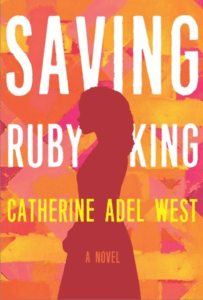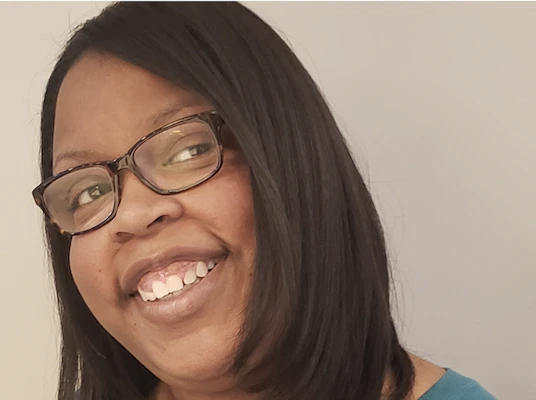By Jael Montellano
Before the pandemic, Catherine Adel West and I enjoyed a scrumptious dinner at The Allis Chicago. We love fine food and told ourselves this would be the spot, our hangout, where in future we would celebrate book successes and talk craft. A few months later, Cathy’s debut launch, Saving Ruby King, occurred virtually on screens across the country instead. No cocktails or champagne at fancy restaurants. Nevertheless, Cathy is thrilled with the reception SRK has received, and has welcomed readers, press and friends into her chili-red-painted bedroom with the same congeniality and humor for which I know her. Even now, a year into quarantine, she has dolled herself up for our virtual chat and combed her hair, just as I have made sure I showered. Over this, we laugh.
We discuss the familial inspirations behind Saving Ruby King, her community, and the ongoing work of SRK’s successor, the prequel The Two Lives of Sara [previously titled Becoming Sara King].
SRK centers around the friendship between Layla Potter and Ruby King, two young black women from the south side of Chicago that have been best friends since girlhood, and the lengths one will go to save her friend when the other tragically loses her mother. Why was this lens important for you to use? Why friendship over, for example, a hetero-normative romance, to examine the trauma that occurs within their families?
Because that’s what gets you through trauma, are your friends or self-made family. Y’all know, in the book, family isn’t always family, but the people you choose to bring into your life, to sort through the really awesome things that happen to you and the terrible things that happen to you, are. I think that and also the power of black female friendships, how intense they can be and what you will DO for your friends. The relationship between Layla and Ruby, that’s the kind of relationship that I wished I had with somebody from elementary school, but I don’t have that; [my brother] Gerald is my old childhood friend. He’d murder anyone for me and I’d murder anyone for him. As a matter of fact, he probably has had to stop me on a couple of occasions ‘cause I didn’t like the way someone looked at him.
An important theme in SRK is generational trauma within a community and the cycles it traps people in. Why did you want to tell that story?

Because it’s not talked about. I mean, in our community, everything is swept under the rug and then we kind of wonder why things continue to happen, because nobody has been speaking their truth, because everybody thinks that silence equals protection, and silence does nothing but compound the trauma. In a lot of black families, they’ll say, ‘Why can’t you just let it go? Like it’s done, it’s in the past, just let it go,’ or ‘Go to church. Pray about it. Hell, that’s what I had to do. I didn’t have no therapist.’ And I’m like, it needs a lot more than prayer! It needs a police report, jail time, and a psychologist! That’s another big thing. Going to therapy is becoming something talked about now, but we’re stuck in this huge health inequity where we can’t afford these things, or these things haven’t been shown to be a solution before. If you went to therapy, they’d be like, ‘Well, you must really be crazy.’ No, sometimes people need it for self-care or you need somebody who’s an objective observer, if there’s something emotional going on, this is how I’m feeling, is this normal? What is a way for me to work through this?
SRK is set in Chicago. We’re Chicagoans, Hypertext is Chicagoan. What story were you trying to tell about Chicago in telling the story of the Potters and the Kings?
I wanted to show the south side of Chicago as I see it, because a lot of times there’s this narrative painted about how horrible the south side is, like there aren’t good families here or good homes and businesses and opportunity.
What is your favorite thing about the south side of Chicago?
When they’re not getting on my nerves, the people. There are so many things to say about a black neighborhood. Everybody knows everybody else’s business; it’s older black ladies sitting out on the porch gossiping, the kids running back and forth, because they’re out of school for the day. It’s the really wonderful, pretty things you don’t see, like parents looking out for their kids, like, boy, you know better, get back on the sidewalk. Or the girls playing double-dutch. And every black auntie would say, ‘Nah, I was the best one at double-dutch,’ you know. ‘No, you wasn’t. You used to turn double-handed.’ It’s a black Norman-Rockwellian version of living. Our version of living may be a little rougher, but it doesn’t make it any less beautiful.
Now you’re working on The Two Lives of Sara, which is SRK’s prequel, but set in 1960s Memphis.
Sara King finds herself in a community where, even though it’s the south in the 60s, she’s done this reverse migration, which is something that I found really interesting to explore. At the end of SRK, I wanted to know what happened to Sara, which basically was the signal that that should be what my next story is about. Sara’s character is someone who comes from a place where she’s closed off and damaged and slowly learns to open herself up.
When I say to people, the next book is about Sara King and her time in Memphis, I get such a viscerally positive reaction! It puts pressure on me and I’m like, please don’t f*** this up. Please don’t. I think I’m doing it justice, I hope.
What have you discovered about yourself and your writing in this second book that you didn’t know in your first?
I’m a lot more confident in terms of how I structure dialogue. When I was writing SRK, I hated dialogue. I was like, give me all the descriptions. With The Two Lives of Sara, the dialogue is [she snaps her fingers]. That’s how I feel. And you know how coworkers got me to read A Little Life by Hanya Yanagihara. I loved the book, but [she clutches her chest] there were things that happened in it that hurt. It’s a book about a guy who just doesn’t get better. Reading that gave me permission to write a book where you’re not going to have a happy ending. That’s what happens sometimes.
What does your current writing habit look like as you’re working on The Two Lives of Sara?
Since January, I’ve been working on the book in earnest. I literally close the [work] laptop, open this laptop and then work anywhere, like, two to four hours every day, and then during the weekends, four to six hours, but it’s paying off, ‘cause I’m almost at 50,000 words now. So that’s 20,000 words a month. I’m really just trying to get this done!
Do you have an expected launch date for it?
I’m thinking summer 2022, but these things are very fluid.
This is something I know about you but I doubt many of your readers know about you. You love opera. How did you come to fall in love with opera?
My dad loves classical music and I have a lot of respect for classical music, but I need words. I need you to tell me a story; about heartbreak, about finding love, about you going to the store and buying a lollipop! Whatever it is. In high school they took us to the opera, to The Barber of Seville, which was freaking hilarious, and I was like, it’s a Mel Brooks movie to music, this is great! And then the first time I heard Aretha Franklin sing “Nessun dorma” from Turandot, and the way she killed that song, she KILLED it. I needed someone to semi-point me in that direction, and then I was like, I think I like opera. And then someone in my family said, ‘Oh, you know, your great-grandma Georgia liked opera.’ Really? I didn’t know that, and that is a connection with my ancestors I love. She was a writer! Apparently that’s where I get my gift from.
Catherine Adel West was born and raised in Chicago, IL where she currently resides. She graduated with both her Bachelors and Masters of Science in Journalism from the University of Illinois – Urbana. Her work is published in Black Fox Literary Magazine, Five2One, Better than Starbucks, Doors Ajar, 805 Lit + Art, The Helix Magazine, Lunch Ticket, and Gay Magazine. Catherine’s short story “Orion’s Star” is featured in the forthcoming body positive anthology Every Body Shines (Bloomsbury, May 2021). Her sophomore novel The Two Lives of Sara is slated for release in 2022. In between writing and traveling, Catherine works as an editor.
Raised in Mexico City and the Midwest United States, Jael Montellano is a writer and editor based in Chicago. Her fiction, which explores horror and queer life, features in the Columbia Journal, Hypertext Magazine, Camera Obscura Journal, among others. She holds a BA in Fiction Writing from Columbia College Chicago. Find her on Twitter @gathcreator.

